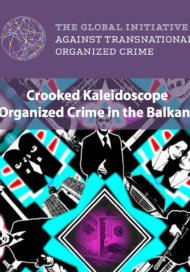Posted on 29 Nov 2018
At the conference of the European Society of Criminology, a panel hosted by the Global Initiative emphasized the need for criminological research to break out of its traditional approaches, and address the threat of organized crime and corruption.
From 29 August to 1 September this year, criminologists assembled in Sarajevo for the 18th annual conference of the European Society of Criminology (ESC). For the host city, the capital of Bosnia and Herzegovina, a country that experienced horrific conflict and notorious acts of atrocities in the 90s, it was chillingly fitting that the conference theme was ‘crimes against humans and crimes against humanity’.
Conferences such as this allow participants to share ideas and research, meet collaborators and move the thinking on criminology forward. They provide a moment to ‘think beyond’ the conference and reflect on what direction ‘criminology’ as a discipline is heading. Does current criminological research adequately reflect the dynamics of the contemporary criminal and political landscape? Are criminologists making full use of the available resources, research methods and modes of thinking? In particular, this ESC conference gave pause for thought on current trends in criminology in the Western Balkans and where organized crime-research should be positioned within the wider discipline.
Global Initiative-led panel on organized-crime research
The Global Initiative, in cooperation with the Max Planck Partner Group for Balkan Criminology, organized a panel themed around organized crime and research into illicit markets and trade in south-eastern Europe. This provided the opportunity for several leading research organizations working in the region to discuss ideas and findings, promote a networked approach to crime research in the region and find common ground for collaborations.
Fabian Zhilla presented current research from the Global Initiative on money laundering by Albanian organized-crime groups of funds generated in UK criminal markets. Trends show that the most successful Albanian criminal groups are those that have forged close ties with political elites. Their money-laundering techniques have also become more sophisticated, shifting from typical front businesses (e.g. real estate, construction and restaurants) to industries such as mining and oil. In recent years, many Albanian organized-crime groups have gained access to Latin American cocaine supply markets and use this to their competitive advantage in UK drug sales. This raises concerns that the profits of the so-called ‘cocaine era’ will be invested in politics, become closely intertwined with ‘legitimate’ business and undermine the rule of law in Albania.
Anna-Maria Ghetoš Kalac, law professor at the University of Zagreb and head of the Max Planck Balkan Criminology Group, and Steve Sin, director of the National Consortium against Terrorism and Responses to Terrorism at the University of Maryland, looked at the interface between organized crime and terrorism in the Western Balkans. They argued that most terrorist organizations in the region engage in criminal activities to sustain themselves. Heroin, of which 60 to 65 tonnes a year are estimated to pass through the Western Balkans into the EU, and arms trafficking were highlighted as particular threats.
Professor Kalac emphasized that factors that have made the Western Balkans a conducive environment for organized crime are geopolitical and conflict-related. Organized crime groups in the region have come to operate as semi-legitimate entities closely interlinked with the political establishment, a phenomenon that undermines the rule of law and poses a great threat to governance democracy in the region.
Tobias Freeman, of the Siracusa International Institute for Criminal Justice and Human Rights, noted the huge amounts of illicit funds that are invested in the global licit economy, and the lack of an adequate governmental and institutional response. The Siracusa Institute is currently conducting a project on Strengthening the Fight Against Illicit Trade in South Eastern Europe, which aims to explore the dynamics of illicit trade in the region and provide effective responses to it. Freeman highlighted how the considerable threats posed by illicit trade in the region need to be tackled by a broad variety of stakeholders, especially customs and law-enforcement agencies and the business community.
Tejal Jesrani Haslinger is a research officer at the UN Office on Drugs and Crime, and principal manager of Measuring and Assessing Organized Crime in the Western Balkans, a project that aims to create a data-based framework for policy research on organized crime in the region. The project, said Haslinger, has established indicators that will be used to measure the level of risk of organized-crime groups, their structure and modus operandi. The framework, consisting of statistics and qualitative data, aims to provide a better understanding of the true costs and financial impact of organized crime. It will help standardize indicators for measuring organized crime and serve as an evidence basis for policymaking.
Taking stock: Whither criminology research?
The panel held by the Global Initiative at the conference can be seen as an early step in bringing together a network of civil-society actors, including academic criminologists, with a shared focus on research into organized crime in the Western Balkans. Through its new Balkan Observatory on Organized Crime, the Global Initiative will aim to build on the expertise this panel convened.
Encouraging as this may be in terms of the promise it holds for future research in the area, it was surprising (and a little disappointing) that this was one of the very few sessions of the conference that addressed organized crime and corruption. This may well be partly a function of this year’s conference theme (i.e. crimes against humans and crimes against humanity), but, nevertheless, the marginal role ascribed to these two considerably important topics begs some serious questions.
One reason may be that, as the expert commentators on the Global Initiative panel noted, in the Western Balkans region, criminological research capacity in the field of organized crime is generally weak. Although there are several leading research institutions conducting projects in the region, specialist, trained criminological researchers tend to be mostly external. Organized-crime research has not featured highly on the local academic agenda.
This deprioritization, however, is at odds with the magnitude and seriousness of the threat posed by organized crime and corruption – generally and in the Western Balkans specifically. As Ugljesa Ugi Zvekic, senior advisor at the Global Initiative, who chaired the panel, said, organized-crime structures found fertile ground after the devastating wars in the Western Balkans and now manifest as a corrosive mixture of politics, business and crime. The Global Initiative panel aimed therefore to site these issues at the centre of criminological discourse at the ESC conference.
The contributions from the expert panelists invited those present to rethink approaches to criminology more broadly and the methods used. The contributors all emphasized the political and economic contexts of the criminological topics under discussion. The research techniques employed also extended on occasion beyond the traditional confines of academic criminology into those more commonly employed by investigative journalists.
As a social-science discipline, criminology has tended to stick fairly rigorously to its traditional methods and sources of data. Predominantly, criminological theory has remained in this traditional garb, focused on individual action and criminal behaviour. As the panel in Sarajevo suggested, however, if we are to understand organized crime in its current forms and modalities, and explain the phenomenon of the ‘organization’ rather than the ‘individual’, we must look beyond criminology in its traditional form to include perspectives of the political economy, geopolitics, social and organizational change, and network analysis.
While this is not to suggest that criminology should move away from its scientific roots, within such a broad-ranging discipline there is surely space for a more investigative form of criminological study, one that incorporates a wider range of research techniques and is thus better equipped to address the pressing threat of modern-day organized crime and corruption – be it in the Balkans or anywhere else, for that matter.



